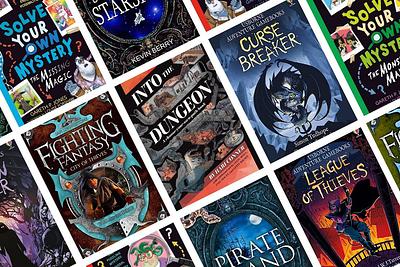What are gamebooks?
Gamebooks, sometimes called, 'choose-your-own-adventure' books, are interactive stories written using a branching narrative style. This allows the reader to actively choose where the story goes, making decisions such as whether to turn left or right, with different outcomes and different endings depending on the decisions they make.
Some of the first gamebooks were the Fighting Fantasy(this link will open in a new window) series, written by Steve Jackson and Ian Livingstone in the 1980s. They were closely tied to the roleplay mechanics of tabletop games such as Dungeons and Dragons(this link will open in a new window), with dice rolling elements for combat, character sheets, and note pages. Many modern gamebooks have a similar style, but some also have picture puzzles, or are written for younger audiences.
The benefits of gamebooks
The branching narrative style of gamebooks is similar to that used in video games, and this means that most young people who pick one up will quickly find that the format feels familiar and accessible. Indeed, this kind of fiction often bridges the gap between gaming and reading, with tools such as Code.org(this link will open in a new window) and Inklewriter(this link will open in a new window) enabling readers to extend their engagement by writing and sharing their own interactive stories.
Like video games, gamebooks also feature exciting and dramatic narratives including puzzles, dangerous encounters, and life and death decisions. This type of narrative gives children autonomy over the story, allowing them to make the most important decisions in the book in a way that suits them (even 'cheating' by reading ahead, if they wish).
As each section of a gamebook is written in short scenes, it also feels less weighty than a novel, with smaller 'bite-sized' chunks of reading to tackle. This makes them more accessible and appealing to readers who are put off by a large chunk of text. Conversely, gamebooks are often read more thoroughly, as readers will often re-read sections to make new choices and take alternate paths.
Reading gamebooks aloud(this link will open in a new window) to a class can also be a lot of fun – pupils can vote on which choice to make, keep an inventory of their gear, make maps of locations, work together to solve puzzles, and role dice for combat encounters.
Our top tips for gamebooks
As mentioned earlier, the classic Fighting Fantasy(this link will open in a new window) series is still incredibly popular. New authors, such as Rhianna Pratchett, have recently released books and there are now over 20 stories set in this rich fantasy world.
Usbourne(this link will open in a new window) have also started to develop a range of gamebooks, suitable for ages 9+. In addition to rich and gripping stories, they feature incredibly detailed picture puzzles(this link will open in a new window) which can prove challenging.
Also aimed at younger readers are Gareth P. Jones' (this link will open in a new window)Solve Your Own Mystery books where readers play as a detective, hunting down missing items or solving crimes. These have a less complicated play style, without character sheets or dice rolling and make a great introduction to the genre.
If fantasy stories are not really your thing, the You Say Which Way(this link will open in a new window) books offer a wide range of varied storylines, from hunting down pirate treasure in Pirate Island to sci-fi drama in Stranded Starship. They also offer a simple playstyle without the need for dice rolling.
Finally, for older readers, Edinburgh based author and illustrator Hari Conner(this link will open in a new window) has a great short gamebook called Into the Dungeon(this link will open in a new window), soon to be followed by Into the Tower. With an easily mapped out dungeon, a choice of characters to play, and varied and interesting puzzles and challenges this short form title would be fabulous for reading aloud to upper secondary children.
If you're looking for more books that tie into a love of gaming, see our (this link will open in a new window)books for gamers list. We also have more information on how gaming can be used as a gateway for literacy, and gaming resources you can use in your classroom.
Happy reading and happy playing!
